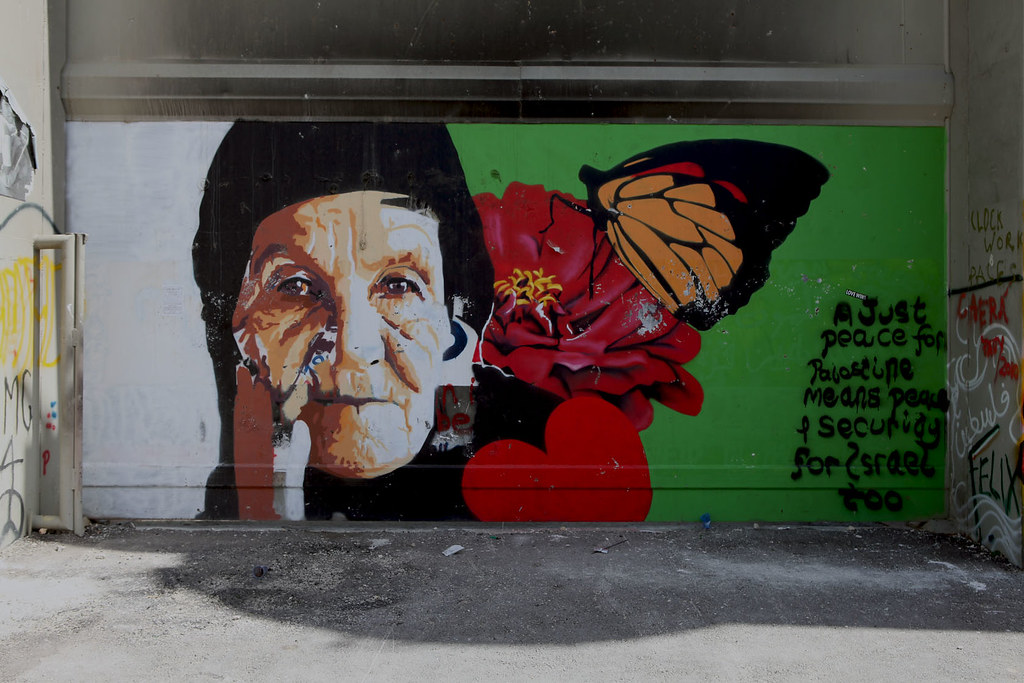
The MachsomWatch is a group of Israeli women volunteers who oppose the Israeli occupation of Palestinian lands as well as the denial of Palestinian rights. They are women taking notes, documenting all the actions that eliminate the humanity of the Palestinians, and advocating for them, calling politicians for support. With their eyes and their voices, they reshape the checkpoints; they show the soldiers the compassion they have lost. The checkpoints are part of the surveillance of a system of separation based on militaristic power.
These women are transnational from within. Their connection with the people who are isolated by a system of separation is the gist of their action. They demand explanation from the blind “kids” (soldiers) who humiliate Palestinians who are just returning home or going to their fields. The Machsom Watch women create a free space that the militaristic state cannot see since the goal is to close up all spaces. But their very presence at the checkpoints forces the Netanyahu government to “see” them; the resisters are acting in the face of oppressive rule, despite their physical vulnerability.
The reality of the checkpoints (Machsom) and the occupation appeared to Daphne Banai, an activist of MachsomWatch, as an impossibility for her enjoyment of life. 70% of the checkpoints are deep inside the territories and so are materially violent disruptors of everyday life. Meanwhile, the justification given to the Israeli public for the presence of checkpoints is precisely to avoid disruption of life because of terrorist attacks.
Daphne Banai explains that when her daughter could have lost her life because of a terrorist attack, she realized that she was on the same side as the Palestinians. All kind of mythologies have created this impossibility to receive the other. Daphne talks about her own mother, a far-right woman who never saw the other side of the story: “She never talked to an Arab person. At her funeral, there were many of my Arab friends.”
Daphne Banai sees the absurdity of the situation for Palestinian refugees to live sometimes just a mile away from their original village. She recalls the time she encountered an old man returning to his home in Palestine from Jordan with a big suitcase. She and her friend offered to drive him to his village, but a curfew had just been established that the old man was unaware of. They arrived at another checkpoint, where despite the old man having all his papers in order, the soldier didn’t want to let him through. They could see his house from the checkpoint. The two women argued with the soldiers for hours, she said. Daphne remembers the conversation, particularly the soldier’s response that he was following orders and he would shoot her if those were the orders. The old man was 80 and that night she was invited to her uncle’s 80th birthday. The old man was now crying; he had no place to spend the night. They managed to go to another village, explained to a family the situation and dropped him off for the night. Then she drove to her uncle’s birthday party and couldn’t stop thinking about the old man crying. The checkpoints are not there for protection; they are there to assert a position of domination guarded by dehumanized robot-type soldiers.
Women’s bodies at the checkpoints brings up layers of meanings, such as the domination over them, their surveillance, and the violence done to them. Their exposure to the ammunition targeting them accentuates the vulnerability of the Palestinian women and children who are humiliated and violated daily. MachsomWatch defies the sexual and economic exploitation that is the basis of surveillance, as it challenges the formation of memorial historical righteousness that make the ethical relation between the self and the other an impossible story. As historian Shlomo Sand asserts, no history is superior to another.

(Photo Credit 1: Palestine Primer) (Photo Credit 2: Flickr / Michael Rose)